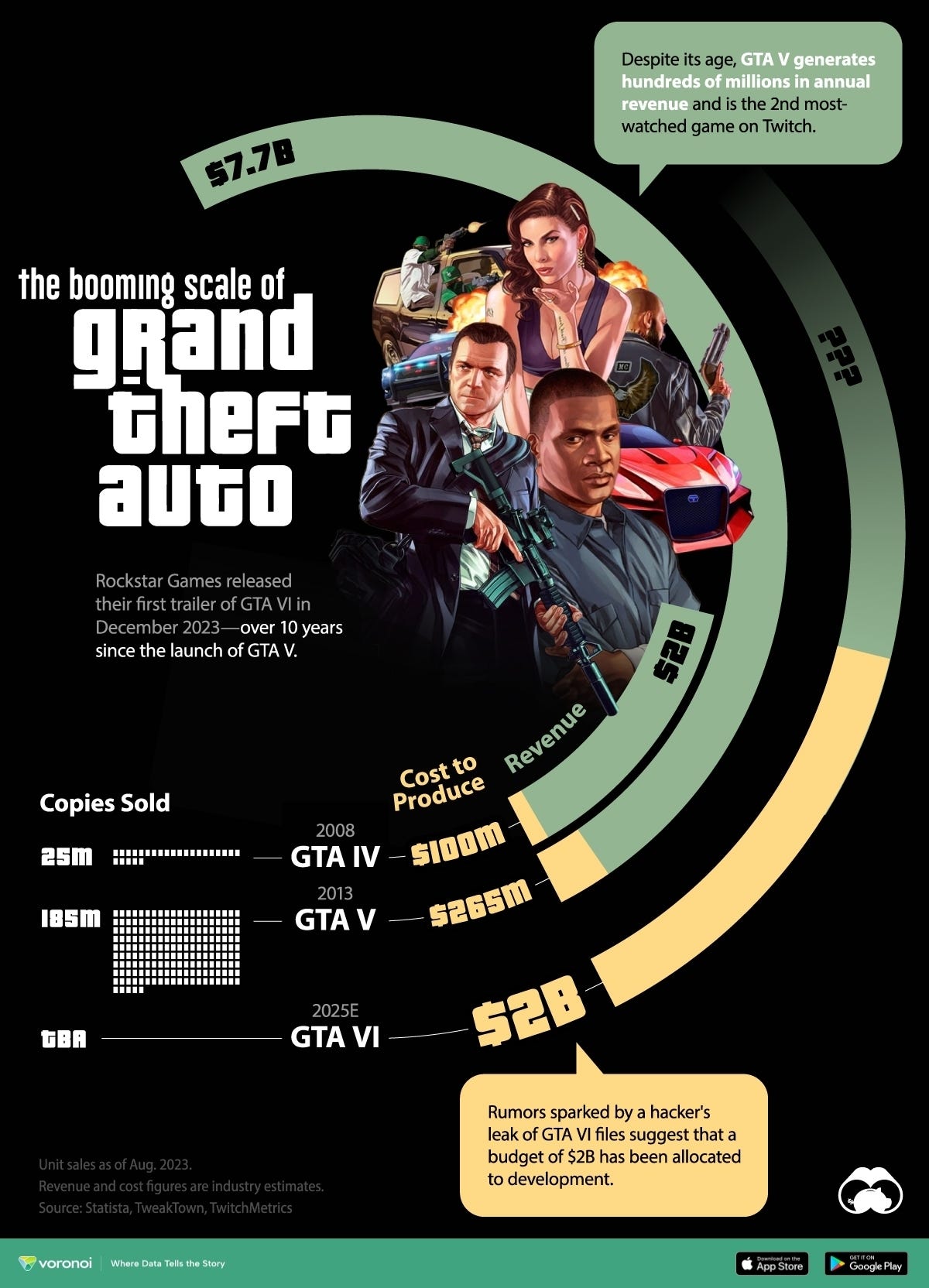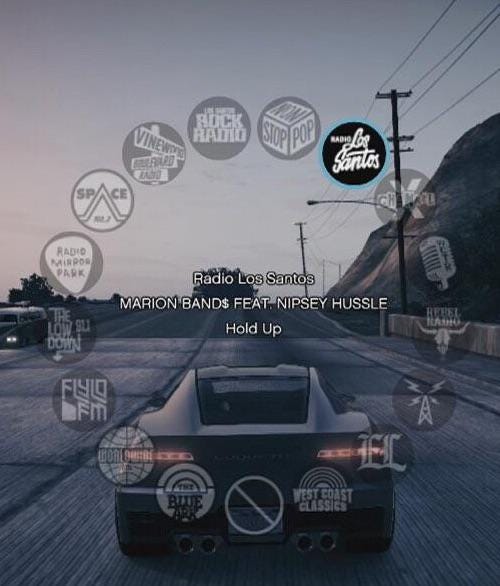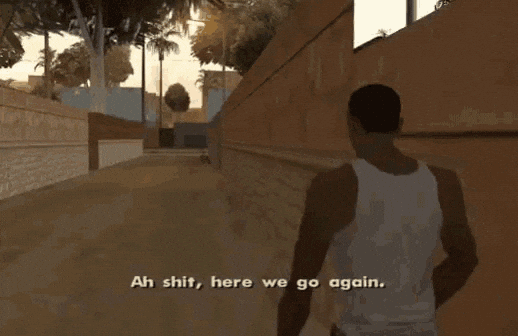“If GTA VI Launches in 2025, It Will Change the Music & Gaming Space Forever“
(K. Vaughan, 2025) Back once again with the ill behaviour.
I made the above claim about Grand Theft Auto VI during a conversation with Mat Ombler and Eric Tan at the start of the year. It might seem a bit out there, but I am standing on business. I’m going to articulate my reasons for such a claim here on SubStack - if you're involved in the music x gaming space, there might be something here to help shape your own conversations.
You can read about the whole chat on
Points I’d like to make:
GTA VI will get attention
What is a ‘use’ of music in GTA VI?
Is GTA VI a ‘digital space’?
Two Possible Outcomes
1. GTA VI will get attention
I can make a fair assumption that this game will get a particular and unique level of attention. Its predecessor, Grand Theft Auto V (GTA V), is already one of the most commercially successful and influential video games of all time and the whole series has grown in popularity across the years.
Some games of note are GTA III (2001), GTA: Vice City (2002) and GTA: San Andreas (2004) selling 14.5 million, 17.5 million and 21.5 million units respectively.
For perspective, GTA V has sold over 185 million copies and has generated at least $7.7 billion in revenue (that’s $7,700,000,000 as written in full). That’s almost one dollar per person on the planet.
Below is a graph detailing some idea of the projected size of this game.
Also for reference, GTA V was already the most expensive game to develop ever…now Rockstar is rumoured to spend 9 TIMES this on the next game.
GTA VI feels particularly relatable because it mirrors a world where people are players—both in-game and in reality. I’m not talking about the over-the-top crime elements but rather the way the game reflects human beings and their interactions, choices, and a living, reactive world, mobile phone uses, fashion etc.
So what does attention mean for music in GTA VI? My thinking is that the sheer size of this game will lean into culture and make video games a topic of conversations for music utility in gaming:
Firstly, GTA V is already a dominant chunk of the video game market, and getting involved with GTA VI is an easy way to get involved with a big portion of gaming without having to understand the breadth of video games and their history for more curated and granular placements.
Secondly, I expect there will be an instance where a track (especially during a key scene) will chart. That will lead to headlines, and further evidence the power of GTA VI in its influence with global cultures.
And lastly (and most importantly) this will likely lead to more rightsholders and artist discussions. Does a game’s massive revenue relate to its valuation of music? Well, Heaven 17 have publically raised their disapproval of the percieved valuation of music inclusions in video games and its likely this new financial forecasting is only going to make that conversation more important to have.
My final thought here is that GTA acts as a curator, shaping its world with a strict narrative vision. Rockstar is building an entire platform and ecosystem designed to capture attention through storytelling and the game's sandbox experience. They are known for avoiding partnerships and brand integrations that don’t align with their world. While Rockstar can get wacky and could afford to make deals, I’m confident that GTA VI won’t include partnerships that feel out of place. For example, you’d never see something like Godzilla wearing basketball shoes and playing in Fortnite (unless it was through mods).
2. What is a ‘use’ of music in GTA VI?
I’ve spent the early parts of my SubStack discussing the taxonomy of music placements in video games because it is still so new and ever changing. Where before, understanding the ‘parameters’ of how music is used in a film/TV is fairly straightforward - you know it will be ‘x’ seconds long, played during this scene, with this context. Great. Now you know how the ‘use’ of music is received by the audience.
But in a video game where there is player agency (where a player can do what they want at any time) - there is suddenly a possibility that someone could buy and complete the game and never come across the music. Or maybe it’s all they listen to! So how do you measure that?
Suddenly the traditional metrics are a guide and no longer gospel. For now it takes an understanding of each game and its history in order to truly gauge (and potentially value) how music is going to be used. That’s pretty much why I started this Substack - that knowledge is valuable in itself.
SUBSTACK SPOILER ALERT - I’ve got another one to add to the taxonomy soon. You are welcome.
Valuation of a ‘use’, is a whole different conversation. I previously mentioned about Heaven 17 saying their offer for GTA VI inclusion of ‘Temptation’ was too small in comparison to the revenue of the game, even if it was $7,500 per writer (3x writers = $22,500).
Let’s run with this - this figure came from the publisher, but there’s no mention of the record label’s part. If this ended up being a similar figure, the total licensing figure for this could be $45,000 (read further in this reddit thread) and the band likely would have received more money from the label too.
If GTA VI paid $45k per track and licensed 1,000 tracks for GTA VI (that’s a guess) - that would be $45 million in music licensing, which is 2.25% of their projected game budget. So it’s not out of the question given how important music is to GTA VI.
This calculation made me think - how do you even value a ‘use’? Regardless of what the fee was, how do you put a one-time value on something where its difficult to assess the impact it has? If you want to gauge how much something is being used, it’s best to have some firm data to prove it. How can that be done?
3. Is GTA VI a ‘digital space’?
In the UK, venues with a ‘PRS’ sticker pay songwriters when they play music—nice! (PRS is the UK’s Performing Rights Organisation (PRO) but many exist worldwide). Should games with large-scale, hard-to-track music use be treated as ‘digital venues’ - paying a blanket license to use and report music? Fair question, but the short answer is… not really.
There’s a big difference between “Can I use your music in this way?” and “I already used your music in this way”. One of the advantages of the current direct-negotiation system is that artists and rights holders maintain control over how their music is used and represented before they are used within these spaces. However, the downside of not having a digital PRO is that there’s no ongoing reporting of in-game music uses. Note: No game has a digital PRO system to my knowledge, this is just me chatting about it.
Having represented and defended artists’ rights for over 10 years 💁 I think having permission and parameters first is important because usages can shape perception, brand alignment, and even long-term career impact.
Let’s put it this way - If your band was called ‘I Hate Bread’, and your band’s message was strongly anti-bread, but was used for a launch of a digital bakery, you wouldn’t be so happy…but I can see the value of ensuring that music used in anyway that enriches an experience should reward the artist. Here’s some bread for reference.
If there’s any controversy or concerns about valuation, but treating GTA VI as a ‘digital space’ seems impractical, is it time for a new framework for a game of this size?
4. Two Possible Outcomes
Firstly, it could be that the launch of this game and the sheer projected size of this game triggers a conversation to have both music and gaming industries work towards the best creative freedom and commercial opportunity for both of them in a new way.
For artists, once you’ve got your fee from Rockstar, there are no additional royalty for in-game plays—despite potentially huge exposure. It’s great publicity (and you’ll likely get out-of-game income from streams etc) but the precise benefits are hard to measure. It depends on so many variables, such as an in-game moment going viral, game campaign focus for added context, or how much an artist wants to lean into the inclusion. (I’ll probably run some numbers on track play count pre and post launch and figure out how valuable GTA’s exposure is)
Top Tip: If you’re featured in GTA VI - lean into it.
Make the most of it. Tell everyone, leverage the massive marketing budget, and run with the buzz while its buzzing—like an expanded version of my Webfishing idea. Fans are excited about GTA VI and will welcome your music in this brand new context.
Not every game should take the same approach - what works for one may not suit another. The ideal outcome of this conversation is a more nuanced dialogue between music and gaming, rather than a singular licensing model applied across all titles and use cases. There’s a vast difference between a game like GTA VI, with its expansive tracklist, and indie developers striving to craft original IP and compelling narratives. Recognising this distinction is crucial because gaming isn’t just 'a format'.
The second possible outcome could be that Rockstar may have already figured out a new approach to music inclusions and it’s about to set a precedent. Even if it is just for a smaller nuanced style of inclusion outside of what we know (score, radio usages, shops, clubs, etc) their arrangement of ‘categorising’ and ‘valuation’ will likely become the frame of reference for future games, especially of this size. Given that Rockstar are spending 2 billion dollars ($2,000,000,000 - and I thought Freddo’s were expensive these days) for this platform, they are the key holders for this discussion at this time.
So this is why I made that statement. I think that the music industry will want to change the game. Do I have an opinion on how? No. But do I think conversations will be had? Probably.
TLDR
GTA VI’s going to be big, and I think it will either change the landscape of music inclusions in gaming or start a conversation to amend the framework to allow for more commercial and creative accessability. Or not, but I think it will.
By the way, I’ll be at Guildford Games on 14th February on two panels, come say hi <3






![GTA V vs Real Life [Side by Side] Part 2 GTA V vs Real Life [Side by Side] Part 2](https://substackcdn.com/image/fetch/$s_!k1Fw!,w_1456,c_limit,f_auto,q_auto:good,fl_progressive:steep/https%3A%2F%2Fsubstack-post-media.s3.amazonaws.com%2Fpublic%2Fimages%2Ff90c0473-f000-4c5b-87dd-a3486775968b_1280x720.jpeg)



